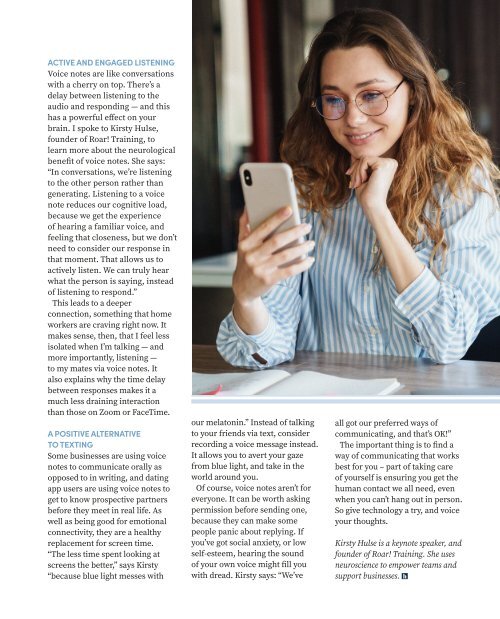Happiful August 2020
Create successful ePaper yourself
Turn your PDF publications into a flip-book with our unique Google optimized e-Paper software.
ACTIVE AND ENGAGED LISTENING<br />
Voice notes are like conversations<br />
with a cherry on top. There’s a<br />
delay between listening to the<br />
audio and responding — and this<br />
has a powerful effect on your<br />
brain. I spoke to Kirsty Hulse,<br />
founder of Roar! Training, to<br />
learn more about the neurological<br />
benefit of voice notes. She says:<br />
“In conversations, we’re listening<br />
to the other person rather than<br />
generating. Listening to a voice<br />
note reduces our cognitive load,<br />
because we get the experience<br />
of hearing a familiar voice, and<br />
feeling that closeness, but we don’t<br />
need to consider our response in<br />
that moment. That allows us to<br />
actively listen. We can truly hear<br />
what the person is saying, instead<br />
of listening to respond.”<br />
This leads to a deeper<br />
connection, something that home<br />
workers are craving right now. It<br />
makes sense, then, that I feel less<br />
isolated when I’m talking — and<br />
more importantly, listening —<br />
to my mates via voice notes. It<br />
also explains why the time delay<br />
between responses makes it a<br />
much less draining interaction<br />
than those on Zoom or FaceTime.<br />
A POSITIVE ALTERNATIVE<br />
TO TEXTING<br />
Some businesses are using voice<br />
notes to communicate orally as<br />
opposed to in writing, and dating<br />
app users are using voice notes to<br />
get to know prospective partners<br />
before they meet in real life. As<br />
well as being good for emotional<br />
connectivity, they are a healthy<br />
replacement for screen time.<br />
“The less time spent looking at<br />
screens the better,” says Kirsty<br />
“because blue light messes with<br />
our melatonin.” Instead of talking<br />
to your friends via text, consider<br />
recording a voice message instead.<br />
It allows you to avert your gaze<br />
from blue light, and take in the<br />
world around you.<br />
Of course, voice notes aren’t for<br />
everyone. It can be worth asking<br />
permission before sending one,<br />
because they can make some<br />
people panic about replying. If<br />
you’ve got social anxiety, or low<br />
self-esteem, hearing the sound<br />
of your own voice might fill you<br />
with dread. Kirsty says: “We’ve<br />
all got our preferred ways of<br />
communicating, and that’s OK!”<br />
The important thing is to find a<br />
way of communicating that works<br />
best for you – part of taking care<br />
of yourself is ensuring you get the<br />
human contact we all need, even<br />
when you can’t hang out in person.<br />
So give technology a try, and voice<br />
your thoughts.<br />
Kirsty Hulse is a keynote speaker, and<br />
founder of Roar! Training. She uses<br />
neuroscience to empower teams and<br />
support businesses.

















